Nov 2022 1st Edition
Nov 2022 1st Edition Joy
English PDF version
Translations
Afrikaans
isiNdebele
isiXhosa
isiZulu
Sepedi
Sesotho
Setswana
Siswati
Tshivenda
Xitsonga
A million work and livelihood opportunities, and counting
A million work and livelihood opportunities, and counting JoyLess than two years ago, we launched the Presidential Employment Stimulus to create jobs and support livelihoods as part of supporting the economic recovery from the COVID-19 pandemic.
The Presidential Employment Stimulus has just reached the milestone of one million participants since its inception.
This achievement is the result of a collaborative effort across government and the wider society, including the private sector, community-based organisations and many others.
The programme is contributing to employment creation while the economy takes time to recover and create jobs at the scale we need.
As we pursue economic growth to deliver decent and sustainable employment at a much larger scale, we will continue to build on the success of the Presidential Employment Stimulus and expand its reach. It is still very much needed to complement recovery of the job market. It also supports economic recovery in important ways.
In a context where a lack of work experience is a major barrier to finding work, these programmes are providing high-quality work experiences.
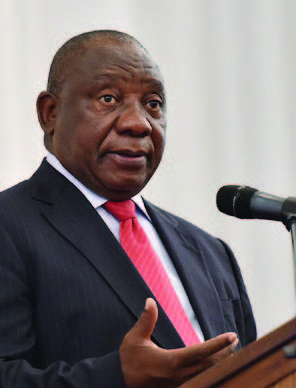 In the largest programme supported by the stimulus, for example, nearly 600 000 young people have been placed as school assistants in over 22 000 schools in every corner of the country. School management, teachers and other stakeholders all agree that the contribution of the school assistants has improved the learning environment in schools.
In the largest programme supported by the stimulus, for example, nearly 600 000 young people have been placed as school assistants in over 22 000 schools in every corner of the country. School management, teachers and other stakeholders all agree that the contribution of the school assistants has improved the learning environment in schools.
Many self-employed people found their livelihoods disrupted by the pandemic. The creative sector was particularly badly affected. In this sector, support was provided to people to create jobs for themselves and others. The movies, music and plays produced are now able to generate further income from the sale of rights, tickets and royalties. All of this has been contributing to the growth of the sector.
The Presidential Employment Stimulus has also supported sustainable livelihoods. Over 140 000 subsistence farmers have received production input vouchers to assist them to resume and expand production after the disruptions of COVID-19.
One such beneficiary is 36-year-old Phindile Ngcoya from Richmond in KwaZulu-Natal. She is one of ten members of a family farming cooperative and says the voucher she received helped the new cooperative survive and become profitable.
The Presidential Employment Stimulus is also supporting graduates, with opportunities provided to nurses, science graduates, artisans and others. Twenty six universities are helping to place unemployed graduates in work relevant to their qualifications.
The Department of Science and Innovation has introduced a range of innovative citizen science programmes, such as the Duzi uMngeni Conservation Trust, which employs local youth as Enviro-Champs to empower communities to rehabilitate local water sources. Another programme by the department helps entrepreneurs to develop business proposals in the green economy.
Public employment programmes also have a direct positive impact on communities because they create work for the common good. In the case of the Presidential Employment Stimulus, this includes improving learning in schools, upgrading informal settlements, supporting survivors of gender-based violence, environmental conservation and innovating in waste-recycling.
The Presidential Employment Stimulus was launched in response to the unemployment crisis that was deepened by the COVID-19 pandemic. Although the pandemic may have abated, unemployment has not.
The incomes earned in Presidential Employment Stimulus programmes have been an economic boost to small enterprises and informal businesses in local economies across the country. School assistants employed in Umgungundlovu are spending their wages in Umgungundlovu. The same in Putsonderwater.
Instead of the ‘trickle down’ effect, money is being put directly into the hands of communities that need it most. That money then circulates locally and ‘trickles up’ into the wider economy.
That is why we call it a stimulus, because the entire economy benefits along with society.
Through the Presidential Employment Stimulus, we have unlocked energy, commitment, creativity, innovation and opportunities. In the process, we are building a society that works.
Over one million people have benefited directly. Many more people, in the families and communities of participants, have felt the impact of the Stimulus.
Our task now is to expand and deepen the impact of this work.
As a result of the Presidential Employment Stimulus, we now have hundreds of thousands of people with valuable work experience. Most of these people are easy to find through the SAYouth.mobi platform.
We call on business to hire these young people with newly-acquired work experience as they leave these programmes.
Once employers see the Presidential Youth Stimulus as a place to find young talent, then we will be able to realise the full potential of this innovative and hugely successful
initiative.
Adverts
Adverts tsoanaVuk’uzenzele newspaper is FREE
Did you know that Vuk’uzenzele
Newspaper is FREE.
Warning
Anyone found to be selling Government information is committing a crime. Call the Crime
- Stop number 08600 10 111 to report fraudulent activities. You can also call government’s National Anti-Corruption Hotline to report corrupt activities you are aware of without giving your name.
- The number is 0800 701 701.
Did you know
Seda provides offerings that assist small businesses in various phases of their life cycle.
Go to: www.seda.org.za
Daughter immortalises Vusi Ximba’s music
Daughter immortalises Vusi Ximba’s music tsoanaIn an extraordinary research paper, Nonjabulo Ximba, the daughter of the late legendary musician Vusi Ximba, analysed her father’s songs for her dissertation to earn her Master of Arts degree from the University of KwaZulu-Natal (UKZN).
And to keep it authentic, she opted to write in isiZulu, the language her father used in his comic-style music.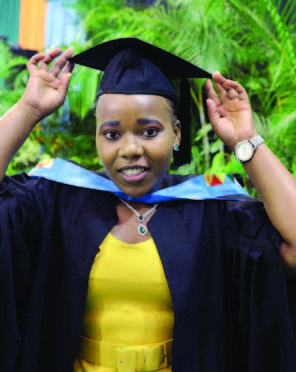
Vusi, who passed away in 2011, narrated real stories into songs. With his signature humour and concertina mastery, the Pietermaritzburg songwriter and satirist recorded over 10 albums, having launched his career by singing in taxi ranks and staging concerts.
His music was banned from many radio stations because his uncensored stories were about sensitive and thorny issues.
Nonjabulo says she wanted to pay homage to her father while preserving his original work. She says her father’s music is no longer available in music stores and says she is concerned that it may fade completely, which is why she chose to analyse it.
For her dissertation, she analysed 47 of his songs, transcribing and analysing the lyrics. Her findings indicate that ‘while some listeners thought Vusi’s music is profane, musical experts have concluded that it is very humorous and touches on subjects very few musicians dare to explore, including sex, prostitution, witchcraft, lies and dishonesty’.
Her dissertation findings also show that while her father’s music did not receive the same acclaim as other top artists, there was something to be learnt from his body of work.
While her topic proposal was done in English, she says she realised that writing the thesis in English would dilute the true version of her father’s music. “I pride myself on being an African and I embrace isiZulu, but the most important thing was to keep my father’s legacy as it is. It will now be archived, and I want the next generations to read the real version [of his work].”
Nonjabulo says she aims to publish four journal articles from her dissertation. Her ultimate goal is to release a book based on her father’s music.
She is currently a part-time lecturer at UKZN. She also has a Bachelor of Social Science Degree and a Postgraduate Certificate in Education, majoring in isiZulu.
Department of Employment and Labour: Inspections
Department of Employment and Labour: Inspections tsoanaADVERTORIAL
Wonderful lessons learned from joint mega blitz inspections in the North West – A model to emulate
The impressive high level of compliance with various labour laws recently diagnosed during mega blitz inspections (involving joint operations) in Potchefstroom only serve to show that with more such vigilance – the workplace in the country could be a model for the world.
Even more pleasing was the thoroughness and meticulous manner with which our inspectors from various parts of the North West together with colleagues from the Department of Home Affairs (DHA) and South African Police Service (SAPS) performed their job.
The aim of the inspection was to target employers in the Road Freight and Logistics – Wholesale and Retail – Manufacturing as well as iron and steel industries.
Furthermore the objective of the mega blitz inspections was to establish and ensure compliance and promote inspectors’ visibility within the J B Marks Municipality.
A report on the inspections supplied to my office showed that all in all – a total of 244 highly thorough inspections were conducted.
Out of those, 170 employers were found to be compliant, while 74 failed to.
Quite clearly, the ideal situation is to have a 100 percent compliance rate, but we know it is an uphill battle and gargantuan task to achieve – almost similar to reaching the highest Mount-ux-Sources.
It comes as no surprise that our inspectors often conduct advocacy sessions at various workplace so as to improve the level of compliance before even considering punitive measures.
It is only when inspectors realise that in spite of infractions or violations having been pointed out to the employers during inspections and the firm having been given an opportunity to correct these, that there is no improvement – that contravention notices are issued.
In terms of positives resulting from blitz we can say: Employers were eager to meet with the inspectors and were very co-operative;
- Department’s visibility was enhanced and the inspectors were seen to enforce different labour laws.
- Both employers and employees were made aware of their rights and obligations in regard to the labour laws.
The flip side of the coin revealed that the most common infractions were:
- Employees were not registered with the Unemployment Insurance Fund (UIF);
- No declarations with the UIF;
- Employees found not to be registered with Compensation for Occupational Injuries and Disease Act (COIDA);
- No return of earnings in line with requirement of COIDA;
- Payments of contributions to UIF not made;
- Non-compliance with Occupational Health Safety Act (OHSA); and
- Employers not paying according to the National Minimum Wage (NMW).
The above show the need for more attention and vigilance to bring about compliance.
The message to employers is to get their house in order before it is too late. We will leave no stone unturned to ensure compliance as reiterated several times by Labour Minister, Mr Thulas Nxesi.
We will not hesitate to haul such recalcitrant employers to court.
At the same time, we commend our inspectors as well as colleagues from SAPS and Home Affairs for the terrific and thankless job they did in the J B Marks Municipality.
It will be amiss of me not to acknowledge the support of the Municipality.
It is also noteworthy to state that during the operations, the Department of Home Affairs arrested 11 undocumented foreign nationals – the bulk of whom – at the road block along the N12 Route.
Speaking at the roadblock, Mr Thulasi Nxesi, Employment and Labour Minister, said the inspections wanted to see the level of compliance with labour laws ranging from the Basic Conditions of Employment Act (BCEA)to Occupational Health and Safety Act (OHSA)as well as observance of the National Minimum Wage (NMW).
“We have already found that several truck drivers are undocumented – are not paid in terms of the collective agreements and are not registered for the unemployment insurance fund. We are warning employers to ensure that they abide by the labour laws or face the music,’’ he said.
The Minister, who was accompanied by myself and the Inspector-General, Ms Aggy Moiloa, said the operation was a sequel to the commitment by a number of ministers a few weeks ago to intensify the programme of action to deal with the employment of undocumented foreign nationals.
Colonel Thabo Mahlangu said his team had been able to arrest the undocumented foreign nationals during an intensive two-hour operation.
We maintain that employers must take responsibility for employing undocumented foreign nationals.
Mr Phumi Maphaha, Acting Chief Inspector of the Department of Employment and Labour, said following the inspection at Chubby Chick on one of the days, the company could not produce the certificate of compliance in terms of the ammonia stored at the plant. He however, said the company had promised to ensure its availability within 24 hours. He said his team was happy with the functioning condition of boilers.
Mr Maphaha expressed concern that fire-fighting equipment had been stolen, which could pose a major risk should a fire break out at the plant. He said the medical surveillance unit had issued a number of notices which would be followed up.
These joint mega blitz operations could soon become a regular occurence as the country wants to ensure that the workplace becomes a model for the world of work and posterity.
Issued by: Deputy Minister of Employment and Labour, Ms Boitumelo Moloi
EPWP used as stepping stone by school uniform manufacturers
EPWP used as stepping stone by school uniform manufacturers ReneilweA group of women from Pomeroy in KwaZulu-Natal have found a way to make ends meet after being given a helping hand by government.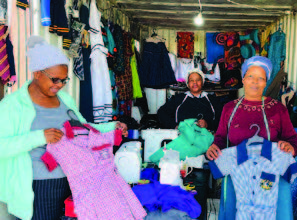
The six women were part of an Expanded Public Works Programme (EPWP) offered by the Umzinyathi District Municipality in 2020/2021. They were employed on a temporary basis through the programme and received sewing training as part of the programme.
The EPWP is an initiative of the national Department of Public Works and Infrastructure aimed at providing income relief and skills training through temporary work. The initiative is implemented by all spheres of government across the country.
Upon the expiry of their six-month contracts, the women returned to their community. With Pomeroy located in the deep rural part of Msinga, where locals spend over R50 to get to a nearby town, the women realised that there would be a market for locally made uniforms.
One of the women, Bongiwe Gabela (50), says the programme was life-changing as they are now able to provide for their families and have created casual jobs for others. Already, they have hired five people to assist in their container workshop.
They supply uniforms to three local schools and are in the process of registering a cooperative so that they might qualify for government support. They hope that if they can get more equipment and a bigger space in which to operate, they will be able to secure more customers.
Gabela says that before the training, she could sew, but not well enough to produce an entire uniform range, including tracksuits. “Our container is a one-stop shop for uniforms and we will add stationery next year,” she says.
“In June, we took part in a fashion show in Dundee and since then, we have been getting more customers for graduation gowns and church uniforms. We also design for special occasions, such as weddings and the Dundee July,” says another of the women, Phumelele Kunene (48).
According to the Retail Clothing, Textile, Footwear and Leather Master Plan, the clothing and textile industry is one of the key sectors for job creation, accounting for 15% of employment in the country. It says government aims to grow employment across the sector’s value chain by over 300 000, by transforming the sector to make it more inclusive.
EPWP projects in your area will be advertised locally, through the local media, ward councillors or on a noticeboard. For more information about the EPWP, call 012 406 1000/2000 or visit www.epwp.gov.za
GDARD 2023 bursary application are open
GDARD 2023 bursary application are open ReneilweHistorically disadvantaged Gauteng residents are urged to apply for a 2023 bursary from the Gauteng Department of Agriculture and Rural Development (GDARD).
Youth in the province who are considering a career in veterinary science, agriculture, the environment or biodiversity can apply for a bursary to fund their studies next year. Applications close on 4 November.
The department says the skills needed for these professions are scarce and the bursaries thus fall in line with its Scarce Skills Talent Pipeline and External Bursary Policy.
Application requirements
To be considered for a bursary, applicants must show proof of admission or provisional admission to a recognised institution of higher learning in the province, for any of the following qualifications:
Bachelor of Veterinary Science
B.Sc. Geo-Informatics or related qualification
B.Sc. Environmental Science / Management
B.Sc. Animal Science
B.Sc. Zoology, Botany or Ecology
Degree/Diploma: Chemical Engineering or Analytical Chemistry
Diploma: Veterinary Laboratory Technology
Diploma: Nature Conservation
Diploma: Graphic Design.
There are different minimum requirements for each qualification, which can be found at https://www.gauteng.gov.za/Publications/PublicationsDetails/%7BFBC0
BC95-E41E-441D-9B14-536E59895304%7D
Applicants must have been living in Gauteng permanently, for at least one year prior to application, and preference will be given to those who excel academically and/or demonstrate potential and those who don’t already benefit from another bursary.
Women, people with disabilities and people living in designated rural areas are encouraged to apply.
How to apply
For more information and to apply for GDARD bursary, obtain an application form from GDARD’s reception office, located at 56 Eloff Street, Umnotho House, Ground Floor; or contact Livhuwani Mutswana at 011 240 2590 or Thandiwe Tsutsu at 011 240 2586.
Applicants must forward their completed application to: Human Capital Management, GDARD, P.O. Box 8769, Johannesburg, 2000 or hand it in at GDARD’s reception office.
Information supplied by GDARD.
Gender-Based Violence
Gender-Based Violence ReneilweGENDER-BASED VIOLENCE
 Get help for GBV
Get help for GBV
As we commemorate the 16 Days of Activism for No Violence Against Women and Children in November, it’s important for victims to know where they can get the help they need from government and civil society organisations.
While information about shelters that house gender-based violence (GBV) victims can’t be published, as this would expose the location of the shelter, victims who are in need of shelter are urged to contact the organisations below for advice.
Gender-Based Violence Command Centre
The Gender-Based Violence Command Centre, which operates under the Department of Social Development, is open every day, around the clock.
The facility employs social workers who are responsible for call-taking and call referrals. It also refers calls directly to the South African Police Service (SAPS) and field social workers who respond to GBV victims. Victims can also contact the SAPS directly at 10111.
Contact: Call the Emergency Line at 0800 428 428, send a ‘Please Call Me’ to *120*7867# or SMS ‘help’ to 31531. A Skype Line is also available for members of the deaf community (add ‘Helpme GBV’ to your Skype contacts).
Website: https://gbv.org.za
Thuthuzela Care Centres
The National Prosecuting Authority’s Thuthuzela Care Centres (TCCs) ensure that a holistic integrated service is provided to GBV victims, including treatment and counselling.
They work closely with hospitals, where rape and sexual assault victims can get treatment and have evidence taken, and with the SAPS to take the victim’s statement. Court preparation services are also provided.
There are more than 50 TCCs in South Africa. For a list of TCCs and their contact details, visit www.justice.gov.za/vg/TCCs-list.pdf
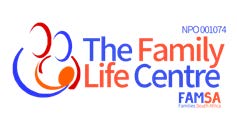 Family Life Centre SA
Family Life Centre SA
The Family Life Centre offers GBV support and counselling. It also offers trauma, individual, couples and family counselling.
Contact: Call 011 788 4784 during office hours.
Website: https://www.familylife.co.za
Rise Against Domestic Violence
Rise Against Domestic Violence assists victims and survivors with their court cases through its Victim Support Programme, which is available to both men and women. The organisation also provides counselling and therapy for both victims and abusers through Vita Nova.
The organisation provides services remotely, throughout South Africa.
Contact: Send a WhatsApp to 081 589 4380.
Gender-Based Violence
Gender-Based Violence Reneilwe People Opposing Women Abuse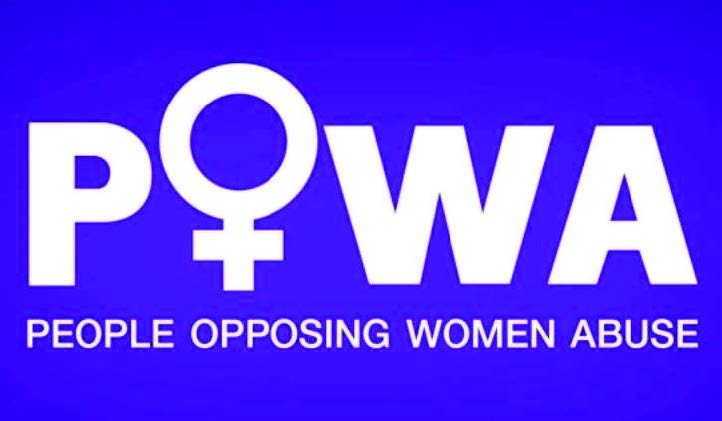
People Opposing Women Abuse (POWA) provides shelter services for GBV victims and their children, counselling and legal advice.
Contact: Call POWA at 011 642 4345 / 6 or the counselling number at 076 694 5911.
Website: www.powa.co.za/POWA
 Tears Foundation
Tears Foundation
The Tears Foundation provides access to crisis intervention, advocacy, counselling and prevention education services for those impacted by domestic violence, sexual assault and child sexual abuse. Services are provided free of charge.
Contact: Call *134*7355# (free) or 010 590 5920 (standard rates apply). Both numbers are available 24/7.
Website: https://tears.co.za
Childline South Africa
Childline South Africa provides services for abused children and their families.
Contact: Call 116 toll-free.
Website: www.childlinesa.org.za
 Child Welfare South Africa
Child Welfare South Africa
Child Welfare South Africa protects children from all forms of abuse.
Contact: Call 087 822 1516.
Website: https://childwelfaresa.org.za
Growing successful farmer is Maesela’s aim
Growing successful farmer is Maesela’s aim tsoanaMpumi Maesela’s passion for empowering female farmers drove her out of her job as a banker and into agriculture.
Maesela says after spending many years working as a banker for the Women’s Development Bank – which focuses on funding and empowering women in business, especially in rural areas – she wanted to do more to help.
Many rural women farm and Maesela decided that getting these subsistence and small-scale farmers to work together to grow enough of each crop to attract commercial buyers was the best way to e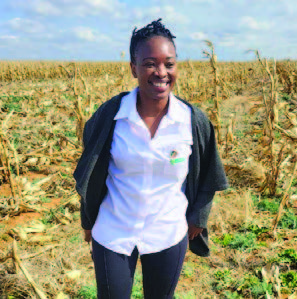 mpower them.
mpower them.
She says it also bothered her that fertile land was unused because the community did not have the money and resources to start farming. Promoting farming was her way of helping communities grow their own food and earn an income.
Maesela left her job and went to Spain, where she learnt strategies to uplift rural farmers. On her return in 2014, she founded SE Holdings, which helps women farmers with technical knowledge, funding, skills and market access. The company also owns heavy agricultural equipment that it makes available to farmers.
In addition, Maesela has built a network of markets, including food manufacturers and supermarkets, to ensure the farmers can sell their produce.
She and her team of 15 work closely with more than 150 emerging and commercial farmers across KwaZulu-Natal, Mpumalanga, North West, Limpopo and the Free State.
“Although SE Holdings does not currently own farms, we do have a small plot where we conduct trials to assist our farmers in producing high-quality harvests. We also provide internships for graduates in agriculture,” she says.
What farmers need to know
If you want assistance from SE Holdings, your land must be accessible, fenced, have access to water and must have recently been farmed. You must have a basic business plan and record of what farming you have done on your land.
“Even if you failed somewhere along the way, you must show us so we can intervene and show you where you need to improve.”
Maesela says farmers have to repay their loans once they start making a profit. However, she says that because SE Holdings helps them secure a market, they should soon be profitable.
She is currently in talks with the Department of Agriculture and Rural Development to form partnerships, particularly to assist beneficiaries of land reform programmes.
Visit SE Holdings’ website www.seholdings.co.za for more information
Learnership programme plugs skills gap and empowers youth
Learnership programme plugs skills gap and empowers youth JoyThe National Youth Development Agency (NYDA) and Chemical Industries Education & Training Authority (CHIETA) learnership programme is preparing a group of youngsters to take their place in the world of work as qualified artisans.
 The programme includes theoretical studies and practical study placement in the electrical and fabrication engineering sectors. The 70 young people chosen from across the country to take part in the programme receive a monthly stipend to enable them to support themselves while they learn.
The programme includes theoretical studies and practical study placement in the electrical and fabrication engineering sectors. The 70 young people chosen from across the country to take part in the programme receive a monthly stipend to enable them to support themselves while they learn.
The programme started in April 2021 and the group is expected to graduate in 2024. The NYDA and CHIETA are unable to confirm if they will train another batch of youth at the moment through the programme.
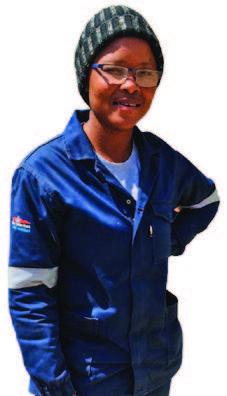 According to the NYDA, its role in the partnership included recruiting learners, identifying accredited training providers and work hosts for learners to do their practical training and co-funding the programme.
According to the NYDA, its role in the partnership included recruiting learners, identifying accredited training providers and work hosts for learners to do their practical training and co-funding the programme.
Meanwhile, CHIETA, a statutory body that aims to help and encourage skills development in the chemical industries sector, is co-funding the programme and approved the selected work hosts and training providers.
Programme beneficiary Hlengiwe Mkhwanazi (35), who was born in KwaNongoma eMsebe in KwaZulu-Natal, is doing her practical training at Electric Eel Contractors in Polokwane, Limpopo.
After matric, she did not have the funds to study further. “It was only in 2018, after I received a National Student Financial Aid Scheme bursary, that I was able to register at Mthashana TVET College in Vryheid. There I obtained an N5 in Electrical Engineering.”
She says while the class was completing the course, their lecturer asked for their CVs so she could help them identify future study or work opportunities.
Mkhwanazi says two months later, she was called for an interview with the NYDA and was later informed that she had been accepted for the apprenticeship.
“I am learning a lot during my practical studies. Now I can do house installation, fault finding and maintenance. I was encouraged to go into this sector because I wanted to be that person who can do all kinds of work, regardless of gender.”
Mkhwanazi says her plans include opening her own company and creating job opportunities for the
youth.
The NYDA advises South Africans between 18 and 35 to register on the data-free youth database (www.sayouth.mobi/) to find out about youth skills and empowerment programmes.
They should also look for funding and other opportunities on the NYDA ís social media platforms (National Youth Development Agency on Facebook, @NYDARSA on Twitter and @nyda_insta on Instagram).
Majola pours her passion into the fuel retail industry
Majola pours her passion into the fuel retail industry tsoanaNot many women are part of the South African fuel retail industry, but Queen Majola (39) is gracefully making her way in a man’s world.
Majola is the proud dealer of a BP service station in Cala in the Eastern Cape.
The mother of two boys started off as a cashier after being unable to continue with her electrical engineering studies because of a lack of funds.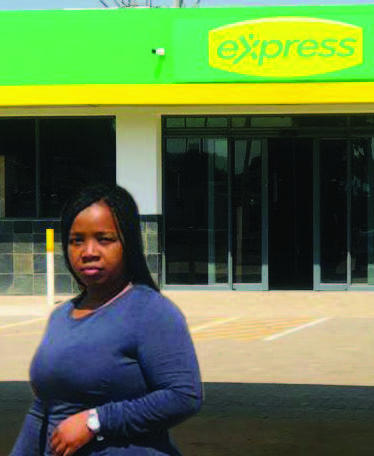
In 2010, upon returning from maternity leave, Majola decided to start her own business, doing stock-taking at several service stations around Durban. “I did not want to continue with my job as a cashier because I knew I wanted more from life. I wanted to create jobs for other people and feed families,” she says.
Through her work, she met Sbonelo Mbatha, who owns multiple service stations in the area. Mbatha became her mentor and challenged Majola to go back to being a cashier in the short term, while she learnt more about running a service station. “My business was not doing well, so I took the position. Within a short period, I was promoted to supervisor and that encouraged my ambition of running my own service station.”
Steady gains
In 2017, Mbatha purchased another service station, BP Seaview, and entrusted her with being the site manager. “The site was pumping 78 000 litres a month and I grew it to 200 000 litres a month.”
She says that thanks to the quarterly meetings for all Mbatha’s site managers, held at different service stations, she was able to ‘grow every day in terms of site operations’.
While working as a site manager in 2020, Majola took the opportunity to enrol in the PetroCONNECT fuel retail industry readiness programme. The transformation programme, according to the company, provides the practical knowledge needed to operate a highly successful service station.
After she completed the programme, Majola says she believed she had what it takes to be a dealer and started applying for her own site. She was officially appointed as a dealer and owner this year.
Women should not be scared to enter the industry, says Majola, because running a service station takes brains, not muscles. She hopes to empower other women to follow in her footsteps and says she is in the process of ‘engaging the Wholesale and Retail Sector Education and Training Authority to help me to keep upskilling those who did not make it as graduates’.
For more information on PetroCONNECT, visit www.petroconnect.co, call 087 094 1622 or email info@petroconnect.co
NSFAS 2023 applications open
NSFAS 2023 applications open JoyThe National Student Financial Aid Scheme (NSFAS) 2023 application cycle has opened.
Higher Education, Science and Innovation Minister Dr Blade Nzimande made the announcement recently during a media briefing.
Minister Nzimande says the scheme resolved to open the application cycle early, as opposed to the previous year, in order to give prospective applicants enough time to submit their applications and supporting documents.
Giving an update report on NSFAS funding for the 2022 academic year, Minister Nzimande says a budget of R43 billion was allocated to the scheme towards the beneficiaries’ tuition fees, including food and travelling allowance, and study material.
He says 985 672 applications were received with 140 636 application unsuccessful.
Of the applications received, 739 526 applications were provisionally approved for funding pending registration from respective institutions.
“[The] majority of unsuccessful applicants failed to provide sufficient evidence to support their applications for funding; exceeded the financial eligibility threshold; already achieved the highest level of qualification that NSFAS funds and being non-compliant to the academic pathways of the TVET college sector,” Minister Nzimande explains.
According to information on the NSFAS website, as of the 2021 academic year, NSFAS no longer provides funding for postgraduate courses. This includes postgraduate certificates, postgraduate diplomas, honours degrees, masters and PhD degrees.
This means the highest qualification that the scheme funds is a Bachelor’s Degree.
Improving the application system
In a bid to improve its application system and process to simplify it for prospective applicants, Minister Nzimande says this year, NSFAS has implemented a number of enhancements to the system to ensure a seamless application experience.
He says the NSFAS online application portal was re-designed to be more user friendly and closer to other platforms that prospective applicants are accustomed to such as WhatsApp, Twitter, Facebook and Instagram.
“The application process itself has been simplified and the questions asked are easier to understand by the public. Additionally, applicants can pause the process and continue at a later stage without restarting from scratch, something that was not possible in previous cycles, he says.
“Over and above the enhancements, NSFAS developed additional channels of application to cater for applicants from diverse backgrounds, also keeping in mind that most of the prospective applicants are young people who embrace the digital way of doing things,” Minister Nzimande adds.
The new channels include a mobile App, USSD and WhatsApp where one can apply for NSFAS funding, track application status and cancel applications, amongst other things. This was previously done via the web portal.
Furthermore, to ensure that no applicant is left behind, Minister Nzimande says NSFAS will embark on an outreach campaign to ensure that individuals who do not have access to technological devices that enable them to apply online are given the necessary resources and support to apply.
How to access NSFAS bursary
You qualify for a NSFAS bursary if you are a South African citizen who plans to study in 2023 or you are already studying at a public university or TVET college and you meet the following requirements:
You are a SASSA grant recipient.
Your combined household income is not more than R350 000 per year.
If you are a person living with a disability, your combined household income should not be more than R600 000 per year.
If you are a student who began university studies before 2018 and your household income is not more than R122 000 per year.
The application period will close on 31 January 2023. – SAnews.gov.za
Visit the NSFAS website at www.nsfas.org.za for more information on the required supporting documents and the application process.
New feedlot boosts KZN lamb production
New feedlot boosts KZN lamb production ReneilweA KwaZulu-Natal (KZN) agricultural cooperative has ventured into the lamb feedlot business, which will help improve the province’s lamb production rate.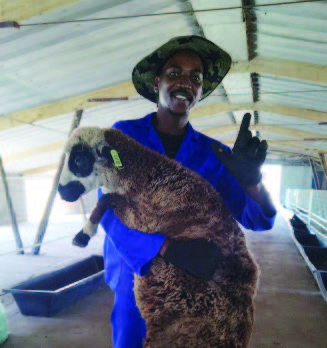
It is among seven cooperatives that have leased broiler houses that were bought by eThekwini Municipality from Rainbow Chicken in the Cato Ridge area in 2017.
The cooperative’s Sihle Miya says while other cooperatives focused on poultry and pigs, which the area is known for, KZN Lamb chose to diversify their business.
KZN Lamb is a subsidiary of Agriculture House Group, which is a holding company of a diverse portfolio of companies including fresh produce farming, sheep farming, agribusiness development consulting services, ICT, bulk portable water supply and hospitality industry.
Miya says that there was a high demand for lamb meat in KZN, but very few producers.
He says they converted the broiler house into a lamb feedlot. They buy lambs between five and eight months old from farmers and feed them for two months, before they are slaughtered.
They get the lambs from the Eastern Cape and Free State provinces because they cannot find local suppliers.
The project kicked off in March with 40 lambs, from which they managed to produce ‘A grade’ meat. To achieve this, the lamb must be less than a year old and must be within the prescribed weight range, which is 48 to 55kg.
“We started small because there is a lot to learn to achieve the results we want. This was the first-of-its-kind project in the area, but we have made positive progress,” he says.
Miya says their initiative was well-received by the markets and they are currently failing to keep up with the demand. From their first batch, they managed to get Pick n Pay supermarkets on board and local Halaal Abattoirs, which both wanted 1 000 lambs per month.
While the response was positive, Miya says they have to grow the business gradually to ensure they maintain excellent standards. He says the lambs require close monitoring in terms of age and weight to achieve the desired outcome.
“Should we be found to have overfed them, we get penalised. Our vision is to produce to the capacity of our feeding house, which is 1 000, but we are careful about the process. We currently have 200 lambs but we have set a target to reach our goal,” he says.
KZN Lamb has created permanent employment for eight people, including an animal health technician, an administrator and general workers.
You can contact KZN Lamb on Tel: 031 265 0171 or 0725274834 (Miya), or email: info@agrihouse.co.za www.agrihouse.co.za/kzn-lamb/
Positions available for more than 1 000 graduates
Positions available for more than 1 000 graduates ReneilweThe South African National Biodiversity Institute (SANBI) is calling unemployed young graduates to apply for its two-year training and mentorship programme.
According to Vivian Malema, the Director of Biodiversity Education and Public Engagement at SANBI, the Groen Sebenza (GS) Phase II Programme aims to recruit 1 050 graduates, from diploma to PhD level, and place them nationally in different government and non-governmental organisations.
Following placement, they will be trained and mentored to develop their competence in managing biodiversity and the environment.
“The programme aims to create jobs for young people, aged 18 to 35. In GS Phase I, more than 600 permanent jobs were created,” says Malema.
Making a difference
GS Phase I was launched in 2013, following SANBI’s successful proposal to the Development Bank of Southern Africa’s Jobs Fund. SANBI Senior Environmental Education Officer Lizeka Gqumani (31), who works at the Walter Sisulu National Botanical Garden, heard about the programme and applied.
At the time, she had obtained a Bachelor’s degree in Botany and Microbiology and an Honours degree in Botany from the University of Zululand.
After being accepted, she worked at an environmental education centre at SANBI’s KwaZulu-Natal National Botanical Garden.
She says she gained a great deal of knowledge about biodiversity and the environmental sector and was taught how to develop resources, work with stakeholders and organise activities and events, among others.
As there was a permanent position available at her workplace when her contract ended, she applied and was permanently appointed.
“The transition felt natural. It was the perfect next step from GS. Instead of learning and assisting, I also had the responsibility to coordinate the implementation of the programmes I was involved in during GS,” she says.
“Was I ready and prepared for this tough challenge? Certainly! The GS journey provided the necessary skills that I have been using throughout my career,” she says.
Gqumani later joined the Wildlife and Environment Society of South Africa as a project coordinator, before returning to work for SANBI.
“The programme saved me from being unemployed and was a kickstart. The stipend was more than decent and I was able to take care of myself and also send money home,” she adds.
How to apply
To apply to the programme, visit SANBI’s website at https://www.sanbi.org/news/groen-sebenza-phase-ii-programme and click on the organisation you would like to apply to.
Pretoria-Pienaarspoort trains back on track
Pretoria-Pienaarspoort trains back on track tsoanaThe resumption of commuter rail services on the Pretoria to Pienaarspoort line on 26 September has lessened the strain on commuters’ budgets.
Commuters were severely impacted when the service was suspended for major rehabilitation work, but they can now travel safely on the new electric trains – for only R8.50 a trip.
The successful resumption of services also means the return of local business to the Pienaarspoort station. Entrepreneurs working at the station had to close shop when the service was stopped, after vandalism and destruction during the hard COVID-19 lockdown left the infrastructure ruined.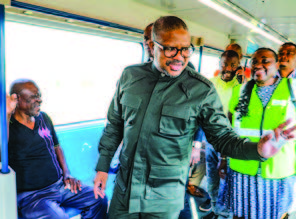
“It is heart-warming to witness the happiness of the commuters because our people are suffering in terms of the cost of living. They are hard hit when it comes to transportation [costs] when the trains are not moving,” Transport Minister Fikile Mbalula said at the opening ceremony.
The line has undergone major reconstruction, with the introduction of advanced signalling technology, modernised high-speed circuit breakers and the use of aluminium wires to counter copper theft. In addition, back-up power supplies mean that the service will not be affected by load-shedding.
Prior to the pandemic, around 28 097 people used the Pretoria–Pienaarspoort rail corridor each day. The current number of commuters is around 5 680 per day. More than 28 000 commuters used the train service in its first week of service.
Get passenger trains going again
At the launch of the Transport Month campaign on 3 October, the Minister spoke about the Rail Corridor Recovery Programme that was started by the Passenger Rail Agency of South Africa (Prasa) in April 2021 to restore services in priority rail corridors around the country. Many lines were closed because of vandalism and theft.
Apart from the Pretoria to Pienaarspoort line, corridors to be restored in Gauteng as a priority include Pretoria to Kaalfontein, Leralla to Johannesburg and Naledi to Johannesburg. New Canada, Mlamlankunzi, Orlando, Nancefield, Kliptown, Midway, Lenz and Tshiawelo stations are also being upgraded.
Prasa has improved its security along the rail network and at stations and will use new technology and additional security personnel to protect the rail infrastructure.
In Addition, the Minister says work is underway to recover rail services on the Cape Town central line. “This entails the relocation of illegal settlements that are currently on the rail track and reserve.”
Protect yourself from unwanted pregnancy and STIs
Protect yourself from unwanted pregnancy and STIs JoyWhile all contraceptives aim to decrease the risk of an unwanted pregnancy, only condoms can prevent you from getting a sexually transmitted infection (STI), such as HIV and AIDS.
 According to the Western Cape Department of Health and Wellness, there are various forms of contraception you can use to help prevent pregnancy, including birth control pills; condoms; female injections; male and female sterilisation; and intrauterine devices (IUDs), which are placed in a woman’s uterus (womb) by a trained healthcare worker.
According to the Western Cape Department of Health and Wellness, there are various forms of contraception you can use to help prevent pregnancy, including birth control pills; condoms; female injections; male and female sterilisation; and intrauterine devices (IUDs), which are placed in a woman’s uterus (womb) by a trained healthcare worker.
Types of contraceptives
Condoms: The only birth control method that offers dual protection – from unwanted pregnancy and STIs. They are available for free at public clinics.
Birth control pills: Must be taken at the same time daily. They don’t prevent STIs. They are free at public clinics.
Injection for women: There are two types. One is given once every two months, while the other is given once every three months. They do not prevent STIs.
IUDs: There are two types, copper and hormonal. They do not prevent STIs.
Sterilisation: A short and simple operation. This is a contraceptive method for males and females. Sterilisation does not prevent STIs.
Contraceptive myths
According to the department, while many people already use contraceptives, some people don’t due to myths that surround them. These include:
Myth: IUDs make women infertile (unable to have a baby).
Fact: According to Sister Bongiswa Mazeke from the Michael Mapongwana Community Day Centre, IUDs are effective in preventing pregnancy and last for three to five years. “These contraceptives do not cause infertility. A female can fall pregnant immediately after removing an IUD,” she says.
Myth: Contraception is the woman’s responsibility.
Fact: “Women and men have an equal responsibility to use contraceptives to protect themselves from HIV, STIs and unwanted pregnancies,” says Maylene Reid, a Professional Nurse in the Overberg District.
Myth: Women can’t fall pregnant while breastfeeding.
Fact: “To prevent pregnancy while breastfeeding, it is best to start another form of contraception soon after delivery,” says Professional Nurse Judiac Ranape, who works in the department’s Southern and Western Districts.
Myth: I can take my morning-after (emergency) pill at any time.
Fact: “The emergency pill must be taken within 72 hours of having unprotected sex to prevent pregnancy,” says Sister Tandiswa Kami, the Operational Manager at the Gugulethu Midwife Obstetrics Unit.
Access care
Visit your nearest clinic for more information about birth control and how to protect yourself from STIs.
Information provided by the Western Cape Department of Health and Wellness.
Putting animals hides on the fashion stage
Putting animals hides on the fashion stage tsoanaTraditional clothing designer Nkazimulo Ngidi will soon supply the bulk of his outfits to informal traders who lost their stock during the KwaZulu-Natal (KZN) floods in April, after he was appointed by the Small Enterprise Development Agency (Seda) to be part of its flood relief programme.
He operates from the busy Warwick Junction in Durban central, where many informal traders were affected by the floods. Through the Seda project, Ngidi will help these traders get back on their feet by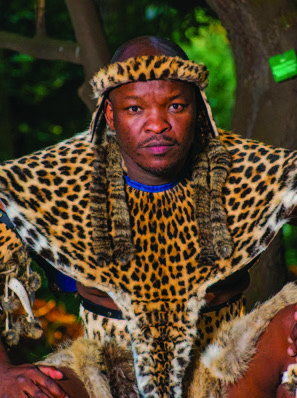 supplying them with traditional clothing stock.
supplying them with traditional clothing stock.
He was appointed by Seda as a provider to supply all traditional attire to informal traders who were affected by floods.
Ngidi says being part of the programme will also help grow his business. In addition, he benefits from Seda’s pop-up markets, which enable him to showcase his range to potential clients.
The 39-year-old has been designing traditional wear from a young age, having learnt the skill from his grandfather. In 2013, he registered his company, Amabheshu Innovators.
Its services include creating traditional outfits from animal hides, putting together traditional outfits for artists and hiring out traditional wear. With the assistance of his wife, Phindile Gumede, Ngidi also designs women’s beads.
He says he collects the cowhides from households that have just slaughtered a cow and buys wild animal hides from hunters in rural areas.
In 2014, he took part in 2014, he took part in a programme run by the Project Preparation Trust (PPT), a non-governmental organisation funded by various KZNgovernment departments and private donors. It manages developmental projects for disadvantaged communities and Ngidi was lucky enough to receive business training.
He has also benefited from taking part in various exhibitions, including the 2016 Essence Festival Durban, which attracted international participants and helped him secure international clients.
He recently won a special recognition award for excellence at the Durban Business Fair.
“There is a strong market for traditional attire of late. People are passionate about their culture,“ he says.
Apart from his family, Ngidi’s business has created employment for 10 people, including casual workers. He plans to open a manufacturing plant and hopes to create more job opportunities.
Informal traders who lost stock during the floods can apply for Seda support by filling in the form available on Seda’s website: www.seda.org.za.
To contact PPT, visit www.pptrust.org.za/contact-us/ or call 031 305 1288
SASSA encourages non-smart phone owners not to choose EFT payment method
SASSA encourages non-smart phone owners not to choose EFT payment method Joy The South African Social Security Agency (SASSA) has appealed to all special SRD-R350 grant beneficiaries or applicants who do not own a smart phone not to choose the EFT payment method.
The South African Social Security Agency (SASSA) has appealed to all special SRD-R350 grant beneficiaries or applicants who do not own a smart phone not to choose the EFT payment method.
The statement released by the agency says the EFT payment method requires smart phones with the corresponding apps for such
a transaction.
“The customer care unit in Mpumalanga has received numerous complaints from beneficiaries where they fail to process the EFT payment,” says SASSA.
“The agency has discovered that all those beneficiaries who cannot process their EFT payment, it is because their phones have little to no computing or internet capacity. The agency is cautioning beneficiaries to choose a suitable method of payment to avoid any inconvenience,” it adds.
All the applicable methods of payment can be accessed on the SASSA official website on https://srd.sassa.gov.za.Beneficiaries.
Applicants can choose to receive payment through official selected merchants and financial institutions.
“Beneficiaries or applicants must ensure that they update personal information such as cell phone numbers, surnames and financial accounts, if there are any changes. This will guarantee the right recipient and avoid payment disapproval,” the agency says.
SASSA has also urged beneficiaries to avoid asking for assistance from strangers when updating their personal information.
The agency says strangers can use the beneficiary's personal details for fraudulent activities. – SAnews.gov.za
For more information, applicants can contact the agency’s toll free number: 0800 60 10 11 or [013] 754 - 9428/9363 from 08:00 – 16:00 during weekdays.
Tackling food security for a growing population
Tackling food security for a growing population ReneilweIn 2019, 17.3% of South Africans were estimated to be suffering from moderate to severe food insecurity, while 7% were estimated to be affected by severe food insecurity. 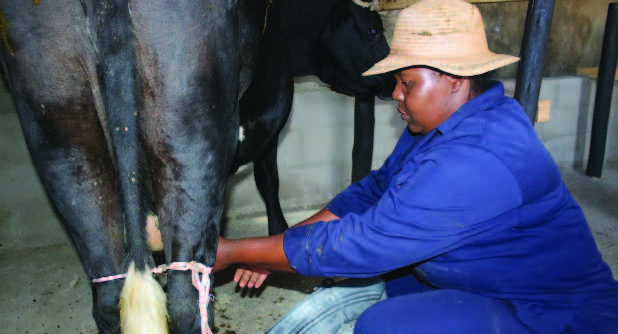
This is according to Statistics South Africa (StatsSA) Survey Statistician Dr Nathaniel Dlamini, who was part of a recent Vuk Talks webinar that saw a panel of experts from the Department of Agriculture, Land Reform and Rural Development (DALRRD), AgriSA and Statistics South Africa (Stats SA) discuss how subsistence farming can sustain food security and alleviate poverty.
Dlamini says while the agriculture sector plays a significant role in food security by keeping South Africans fed through the production of beef, poultry, fish, fruits and vegetables and grains and maize, the country faces various challenges that affect food security, including poverty, unemployment, income inequality and climate change.
“Poverty-stricken households lack money to buy food and are constrained by the inability to secure employment or generate an income,” he adds.
Tackling challenges
The Director of Smallholder Development at the DALRRD, Dr Jemina Moeng, says government has put various mechanisms in place to address food insecurity and continues to implement the National Food and Nutrition Safety Plan (NFNSP) 2018 to 2023.
“The National Food and Nutrition Safety Council has been established, and the Human Sciences Research Council is continuing with its study to review and analyse possible additional sources for funding and implementing the NFNSP,” says Moeng.
The Presidential Employment Stimulus is also facilitating self-employment and improving the livelihoods of marginalised households.
As part of the stimulus, the DALRRD is focussing on subsistence producers to enable them to produce their own food; intensify the production of certain high-value crops, such as avocados; and increase the production of grains and oilseed crops, horticultural crops (fruit and vegetables), livestock (cattle, sheep, goats and pigs) and poultry (broilers and layers).
“Training is being provided on agro-processing and market access through the Smallholder Horticulture Empowerment and Promotion approach; contractual employment is being created for youth (unemployed and graduates) through on-farm placement; and agro-value chain businesses for women and youth in rural, peri-urban and urban areas is being facilitated,” says Moeng.
The department also provides a comprehensive agricultural support programme, in the form of grants, and the Ilima/Letsema programme, for subsistence producers, enables people to produce their own food.
The Executive Director of AgriSA, Dr Christo van der Rheede, says the organisation has implemented various development programmes for farmers and recently approved a number of blended finance loans for a range of black female and male farmers. For more information about the programmes, visit https://agrienterprises.co.za.
Beneficiary shares her success
Agripreneur Lerato Senakhomo, the Director of Senakhomo farm in Sedibeng in Ekurhuleni, is one of the DALRRD’s beneficiaries.
She owns a 435-hectare farm which she uses for grain, pasture and livestock production.
Senakhomo has won numerous awards over the years, the latest being the Agricultural Research Council’s National Beef Emerging Farmer of the Year (2020).
She is part of the Gauteng Department of Agriculture and Rural Development and Industrial Development Corporation’s Nguni Cattle Development Project which aims to reintroduce the Nguni breed in black farming communities in the province.
“I became involved in the programme in 2018 and got 72 cattle via a loan which must be repaid within seven years,” says Senakhomo.
She also buys sheep and goats from local auctions, fattens them up and resells them to local clients.
Last year, she planted 80 hectares of maize and 40 hectares of soya; and her pasture produces 300 bales twice a season. Thanks to a new tractor she received from DALRRD, her maize production has increased to 160 hectares.
The farm employs eight permanent and 36 seasonal workers. It also benefitted from the COVID-19 Relief Fund which, she says, helped her to buy supplements for the animals ahead of winter.
For more information about DALRDD grants and assistance, contact your provincial DALRDD office or visit www.dalrrd.gov.za
Toilet paper business leaves man blushing with pride
Toilet paper business leaves man blushing with pride tsoanaWhen Limpopo-born Thabang Monyepao (26) abandoned a future career in aircraft engineering in 2018 to start a company that manufactures toilet paper, he knew he had to make it work.
At the time, he was doing an internship for his aircraft engineering qualification.
“In 2018, during my tertiary studies, I started thinking about possible manufacturing businesses. After much research, I decided on tissue manufacturing.” And so Delight Softies was born.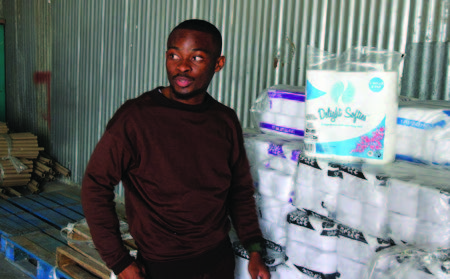
Monyepao registered the business and started a small-scale production line. In 2019, he received a R50 000 business grant from the National Youth Development Agency and that enabled him to purchase raw materials to produce more stock.
“The money enabled us to increase production and in so doing, produce more stock. By having more stock, we were then able to approach more clients. The funds really boosted our business.”
It was through the support of the Small Enterprise Development Agency (SEDA) that Monyepao was also able to get marketing material. In addition, the Department of Trade, Industry and Competition enabled him to participate in the Intra-African Trade Fair (IATF) that took place in Durban last November.
“Being an exhibitor at the IATF and interacting with businesspeople from across the continent opened my eyes to the prospect of a massive market, not just locally but in the rest of Africa.”
At present, Monyepao employs seven women and three men. Both single and double-ply toilet paper are manufactured at his Polokwane plant.
He says that even though the entrepreneurship journey is not easy, it is important for South Africans to be part of it. “Manufacturing is a space that we lack skills in. Many manufacturing plants are not locally owned; the narrative should change so that we can be role players in the economy.”
He says his plans include having his own mill and increasing capacity. “I want to own a mill that manufactures pulp and jumbo rolls from scratch. Presently, we buy huge chunks of uncut toilet paper, which we then cut and package to sell.”
For more information, contact SEDA on 0860 103 703 email info@seda.org.za or visit www.seda.org.za.
Unique upside-down edu-centre unveiled in North West
Unique upside-down edu-centre unveiled in North West JoyMinister of Basic Education Angie Motshekga has unveiled a one-of-a-kind upside-down educational institution in Rustenburg in the North West.
 The Surprise Shondlane Upside Down School, situated at the Ten Flags Educational Theme Park, is said to be the only functional upside-down ‘school’ in South Africa. While it will not function as a regular, everyday school, it invites education institutions from all over to bring their learners for an innovative day trip.
The Surprise Shondlane Upside Down School, situated at the Ten Flags Educational Theme Park, is said to be the only functional upside-down ‘school’ in South Africa. While it will not function as a regular, everyday school, it invites education institutions from all over to bring their learners for an innovative day trip.
Speaking at the launch, Minister Motshekga said the centre is equipped with modern technology.
“The upside-down concept was designed to give our children a practical example of thinking outside the box in their daily lives. It is also home to a wealth of activities that teach independent thinking and all-around curiosity, focusing on engineering, sciences and information and communication technology,” she says.
Ten Flags Theme Park Project Manager Tshepang Maqabe says the concept for the centre is the brainchild of the theme park’s CEO and founder, Thapelo Tshephe, who discovered on his travels that there are several upside-down houses across the world.
“This inspired him to incorporate education and functionality in the upside-down concept,” says Maqabe.
Tshephe named the centre after a close colleague, Surprise Shondlane, who tragically passed away in a car accident in August 2022.
The centre features upside-down equipment, including musical instruments, projectors, stoves, fridges, microwaves, water urns for boiling water and air-conditioners. Even the functional showers and bunk beds are upside down.
Maqabe says visiting schools will benefit from motivational speakers and on-site teachers, who will ensure the outings are both meaningful and aligned with the schools’ curricula.
Stimulating STEM learning
In welcoming the centre’s promotion of technological and innovative thinking, the Minister said: “It is estimated that by 2025, as many as 80% of all future jobs will require a science, technology, engineering and mathematics (STEM) education.”
Maqabe agrees that STEM education is important and as part of its ongoing projects, Ten Flags will build a new educational theme park every year for the next 10 years, with over 10 activities per park.
“Ten Flags is an innovation hub, so more innovation and inventions that are mind-blowing are on the way,” says Maqabe.
To book a school visit, call 014 941 0823 or 061 506 2600, visit www.tenflagsthemepark.co.za or email info@tenflagsthemepark.co.za
Victim empowerment programme restores hope
Victim empowerment programme restores hope JoyThe Thohoyandou Victim Empowerment Programme (TVEP) strives to restore hope and confidence in the justice system through its intensive initiatives aimed at assisting survivors of gender-based violence (GBV) and rape by providing them with psychosocial services.
 Founded in Limpopo over 20 years ago, the TVEP operates in Tshilidzini and Donald Fraser hospitals under the Thulamela Local Municipality.
Founded in Limpopo over 20 years ago, the TVEP operates in Tshilidzini and Donald Fraser hospitals under the Thulamela Local Municipality.
Its Acting Director Fhatuwani Manthada says the programme aims to instil a zero-tolerance attitude towards sexual assault, GBV and child abuse among Thohoyandou residents, given the fact that these cases are prevalent in the area.
He says in the past, crime statistics indicated that there were many rape cases in Thohoyandou, but the TVEP has made great strides in raising awareness and providing trauma counselling services to curb the scourge.
As the world will be observing the 16 Days of Activism for No Violence Against Women and Children from 25 November to 10 December, Manthada says the programme is satisfied with the progress made with encouraging residents to understand their rights and report crimes.
“The TVEP receives between 80 and 100 victims of domestic violence every month, while 45 to 50 rape cases are reported monthly,” says Manthada.
The programme’s one-stop centres offer a wide range of services to victims, including access to legal assistance, protection of victims against perpetrators, court case monitoring, counselling and empowerment through skills development, thus giving the victims a fresh start.
Manthada states that the TVEP works closely with the South African Police Service, Department of Health and Department of Social Development to prevent secondary traumatisation of victims in the process of opening a case.
“In rape cases, healthcare workers and the police come to the TVEP centres to assist victims to open criminal cases against the perpetrators and also provide counselling services,” he says.
The TVEP accommodates victims for up to 14 days, however, the arrangement could be extended in cases that involve the whole family or children.
“We have empowerment unity that conducts public dialogues and educates people about their rights. We serve more than one million residents from Thohoyandou and surrounding areas. We have managed to restore hope and people now have trust in the criminal justice [system] through our relationship with the police,” he says.
The TVEP has also created employment for 44 people who serve in various departments such as finance, human resources and evaluation.
Despite receiving continuous funding of R90 000 quarterly from the Limpopo Department of Social Development, the TVEP was affected by COVID-19 as many funders pulled out, thus negatively affecting the organisation’s operational processes.
However, the Gender-Based Violence and Femicide (GBVF) Response Fund, which was launched by President Cyril Ramaphosa, together with the International Women’s Forum of South Africa and social partners have assisted the programme.
The TVEP was among the first batch of the organisations, that fight against GBVF, to receive funding.
With the sum of R128 million that was raised through contributions by the private sector, multi-sectoral fund, the GBVF Fund will assist and support the implementation of the National Strategic Plan on GBVF.
The TVEP has been allocated R250 000 for the current year and will receive more funding for 2023.
Manthada says the funds have enabled the TVEP to reach out to more victims and keep the organisation running.
Murendeni Vhengani (26) is a survivor who was rescued by the TVEP from her abusive ex-boyfriend. She spent 46 months months at the centre, with her four-year-old daughter.
The centre assisted her to open charges against him and to file a protection order. He is still on trial.
“They welcomed me with warm hands after many years of suffering. I felt safe. I have regained my confidence,” she says.
The GBVF Fund chairperson, Dr Judy Dlamini, says funding for 108 organisations whose applications have been successful are being processed.
Information regarding the next round of applications will soon be available on the GBVF Fund website: https://gbvf.org.za/.
To reach out to TVEP, contact Manthada at 064 771 5264 or email: atj@tvep.org.za.
